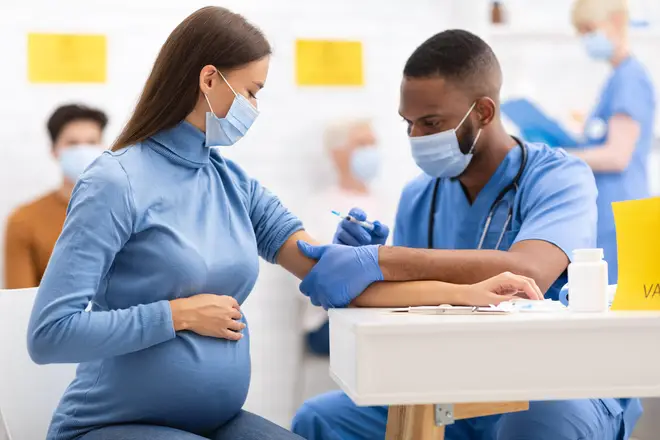
Nick Ferrari 7am - 10am
3 August 2021, 00:02 | Updated: 3 August 2021, 00:06

A new study is being launched to determine what the best gap is between coronavirus vaccine doses for pregnant women, with scientists hoping findings will reassure expectant mothers on the safety of the jabs.
Researchers are aiming to recruit more than 600 pregnant women for the latest Preg-CoV trial, which will monitor the vaccine's effectiveness and follow the development of children up to one year old.
Dr Pat O'Brien, vice president at the Royal College of Obstetricians and Gynaecologists, said the findings of the study are likely to be relevant "for many years to come".
He said: "This is an important study. We feel comfortable with the safety of these vaccines. What we want to understand now is how to fine-tune them, to understand better how they work. What's the optimal way of giving them?
"Do they work as well in pregnant women as in other people? Bear in mind this pandemic is likely to become endemic, this is likely to be ongoing. So I suspect that the findings from this trial will be relevant to us, to pregnant women for many years to come."
Read more: Tests at stations and on trains find no traces of coronavirus
Read more: Covid-19: What are the latest changes to the travel rules?
The launch comes less than a week after research revealed the vast majority of pregnant women admitted to hospital with Covid-19 are unvaccinated.
Those behind the trial said while there are currently no safety concerns when it comes to pregnant women having Covid-19 jabs, they hope it will give expectant mothers and those caring for them "the highest quality of data about these vaccines".
England's chief midwife has written to GPs and fellow midwives across the country urging them to encourage expectant mothers to get a jab.

Caller tells LBC the mixed advice she had on getting Covid vaccine.
The trial - the UK's largest investigating the best gap between first and second doses for pregnant women - involves £7.5 million of Government funding and is being led by St George's, University of London.
"The coverage (uptake) of vaccination in pregnancy at the moment is disappointing, it's low, less than a third,” said Professor Paul Heath, chief investigator and professor of paediatric infectious diseases at St George's.
"I suspect that one of the reasons for that is that they do not feel confident enough about vaccination. Perhaps participating in a trial will give them that confidence."
He said he hoped a lesson to be learned from this pandemic is "the need for including pregnant women in vaccine trials at an earlier stage" and acknowledged such a trial "could have started six months ago".
Read more: NHS Covid app tweaked so fewer contacts have to self-isolate
Read more: LBC Views: Tom Swarbrick makes the case for vaccine passports to avoid a Winter lockdown
Professor Asma Khalil, lead obstetrician for the trial and professor of obstetrics and maternal fetal medicine at St George's, said the most common question from pregnant women is whether they should get the vaccine.
She said while there is data showing no safety concerns following vaccination in pregnant women, there remains a worry among patients because pregnant women were not included in initial Covid-19 vaccine trials.
"The data we have are good, and provide some safety reassurance but what we want to aspire to is the top quality, the high quality data from randomised controlled trials which this trial will provide,” said Prof Khalil.

Professor's message for vaccine hesitant young people
Vaccines involved initially will be the Pfizer/BioNTech and the Moderna vaccine but other new vaccines will be included as they are approved in the future.
Women aged 18 to 45 will be recruited from some 15 sites across England if they are between 13 and 34 weeks gestation at the time of vaccination.
The sites include St George's University Hospitals NHS Foundation Trust, University Hospital Southampton NHS Foundation Trust and St Michael's Hospital, University Hospitals Bristol and Weston NHS Foundation Trust.
Participants will randomly receive one of the vaccines either at a four to six week dosing gap or the longer eight to 12 week dosing gap.
Read more: Police officer guilty of assaulting two people including teenager in Covid lockdown
Read more: Rule changes to end pingdemic ‘nailed on’ for August 16, PM tells LBC
The first trial results, looking at any adverse events following a first dose, should be available towards the end of the year, while immune response results are expected in the first quarter of next year.
Last week researchers at Oxford University found that one in 10 prenant women admitted to hospital with symptoms of Covid-19 often require intensive care, something they called "concerning".
Marian Knight, professor of maternal and child population health at the Nuffield Department of Population Health, University of Oxford, and chief investigator of the study, said pregnant women can be "reassured" about the safety of the vaccines and that antibodies will be passed to their babies.